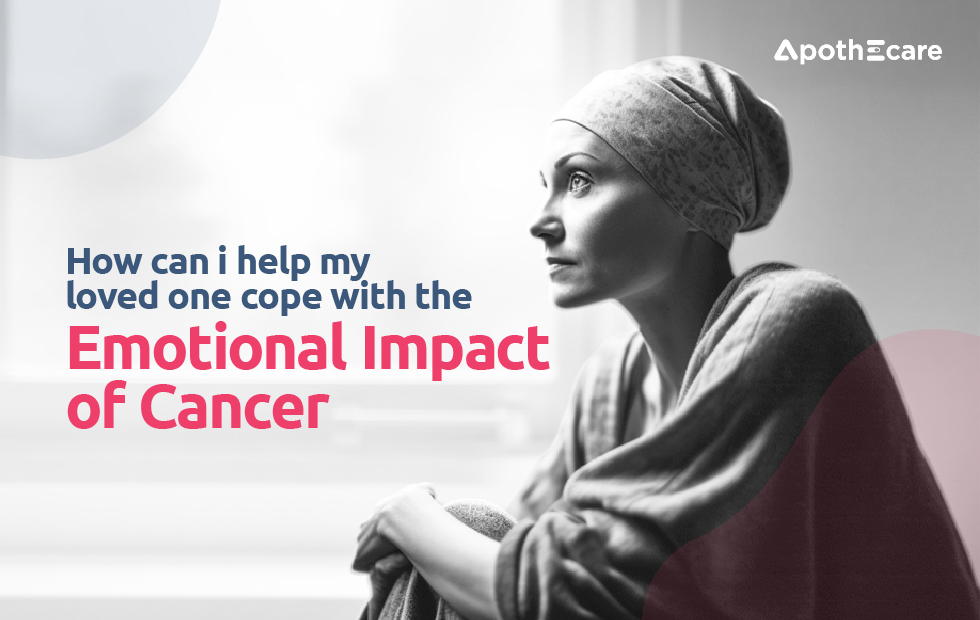
How to Provide Emotional Support to Cancer Patients and Caregivers
When a friend or loved one has cancer you might be wondering about how best to help and support them. Most people require you to be open and attentive to their feelings, even if you are initially confused of what to say or do. It might be really beneficial to know that you are there for them. A cancer diagnosis and subsequent treatment journey might be emotionally overwhelming, not only for the patient but also for family and friends. The way your loved one handles things can be greatly impacted by your support. Here are a few significant ways you can assist:
Anger: It's common to experience anger after a cancer diagnosis, which frequently results from feelings of helplessness, irritation, or fear. Anger can motivate action in the moment, but clinging to it can be harmful to your relationships and yourself. You can manage and let go of this anger by talking to loved ones or a counselor about how you're feeling.
Fear: Following a cancer diagnosis, fear and anxiety are normal and are frequently associated with pain, treatment modifications, family, money, or even mortality. Finding out the truth helps reduce anxiety because many worries stem from misunderstandings or ignorance. Patients who are well-informed are better able to manage their symptoms, adhere to their treatment regimens, and possibly even recover more quickly.
Gratitude: After receiving a cancer diagnosis, practicing gratitude can help refocus attention on happiness and special occasions. Comfort can be found in simple pleasures like spending time with loved ones, taking in the scenery, or relishing little everyday delights. Accepting these satisfying experiences promotes emotional fortitude and recovery.
Guilt: Cancer patients frequently experience guilt, which is frequently connected to concerns about their loved ones, jobs, money, or previous decisions. It's critical to keep in mind that cancer is not your fault and that experiencing this emotion does not imply that you have done anything wrong. These emotions can be lessened by having an honest conversation with a counselor or other supportive individuals.
Loneliness: Cancer patients may experience loneliness because their friends may distance themselves, they may lack the energy to engage in activities, or others may not really comprehend what they are going through. Many patients still feel isolated or miss their care team's support even after treatment. Seeking solace and easing these emotions can be accomplished by connecting with loved ones, counselors, support groups, or spiritual communities.
Hope: As people get used to their cancer diagnosis and treatment regimen, hope frequently increases. Cancer survival rates are higher than ever, and many people lead active, full lives both during and after the disease. Maintaining daily routines, developing a spiritual or natural connection, and drawing inspiration from the tenacity of others are all ways to cultivate optimism.
Depression: Although sadness is a normal reaction to cancer and the changes it brings, depression may develop if these emotions worsen and become disruptive to day-to-day functioning. Cancer patients frequently experience depression, which has been connected to both medication side effects and mental stress. The good news is that it's a treatable medical problem, so it's crucial to get help from medical professionals.
Feeling Overwhelmed: After receiving a cancer diagnosis, it's normal to feel overwhelmed because routines, health, and emotions are all affected. You might feel more in control of your cancer by learning more about it and asking questions. Stress can be reduced and a sense of normalcy restored by striking a balance between this and pleasurable pursuits like hobbies, music, or reading.
Emotional support to Cancer Patients:
Emotional support from friends and family can significantly improve a cancer patient's quality of life, according to research. People frequently worry that they will say something inappropriate to a cancer patient. You may be a terrific support if you are open-minded, honest, and express your concern. Here are some advice that could be helpful you as well.
Do:
· Call your loved one frequently, send them notes and texts, and pay them a visit when you can. Just don't forget to call before you come.
· Assist a loved one with cancer by helping them around the house or running errands for them.
· Giving someone a small, considerate present is enough to make their day. It could assist someone who is coping with cancer feel better.
· If it seems suitable, take them for a quick walk or coffee; spending time in nature might be beneficial.
· Provide assistance during the whole diagnosis process, including before, during, and after therapy.
Don’t:
· Stop Talking: You don't have to limit your conversation to their cancer, but don't be scared to inquire about it either. Give your loved one your full attention.
· Every person's experience with cancer is different, so compare their circumstances to those of others you know.
· Doubt Yourself: Don't be scared to offer your loved one emotional support. Attending cancer support groups is a fantastic way to get active in support, even though it may be challenging.
· Instructing them to "be strong," "be positive," or "fight it" puts pressure on them to act in a particular way.
· Try to fix everything: Don't offer family members advice they didn't request, and don't pass judgment on their choices either.
Which Options Are There for Mental Health Care During Cancer Treatment?
Many hospitals and cancer centers now offer mental health services as part of their overall cancer therapy. This could include:
1. Therapy sessions with clinical psychologists
2. If required, psychiatrists for medication
3. Social workers who offer financial and emotional help
4. Support groups facilitated by qualified experts
5. Options for online therapy for people who can't go
You can get a referral to a mental health professional from your physician. Some non-profits provide free sessions for cancer patients and their families, and many services are reimbursed by health insurance.
FAQs:
1. What am I supposed to say to them—or not?
Statements like "I'm here for you" or "It's okay to feel this way" are appropriate. Avoid sayings that minimize their true feelings, such as "Stay positive" or "Everything happens for a reason."
2. What feasible steps can I do to reduce their stress?
Assist with reminders for medications, food, appointments, and housework. They have more emotional room to deal when their everyday responsibilities are lessened.
3. How can I help them and look after myself at the same time?
It can be emotionally taxing to provide care. Rest, chat with friends, or enroll in a support group for caregivers. Better support for the patient results from a healthy caregiver.
4. How can I provide emotional support to a loved one who has been diagnosed with cancer?
Give them space to express their emotions, be there, and listen without passing judgment. There are moments when nothing is more consoling than simply sitting quietly together.
5. How do I respond to their rage or mood swings?
Recognize that impatience, fear, and irritation are normal. Don't be upset about it. Be patient with them and let them know that you understand how they feel.
Reference:
1. https://www.cancer.gov/about-cancer/coping/feelings#overwhelmed
3. https://bmchrc.org/blog/cancer-and-emotional-health-tips-for-patients-and-caregivers
4. https://www.cancertodaymag.org/spring-2025/how-can-i-help-my-loved-one-with-cancer-process-anger/
5. https://www.cancer.org/cancer/caregivers/how-to-help-a-loved-one-in-distress.html
6. https://health.clevelandclinic.org/cancer-the-emotional-roller-coaster-9-ways-to-help-your-loved-one





